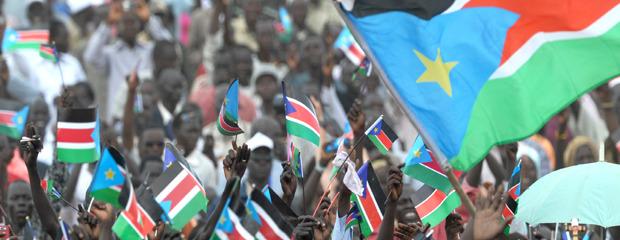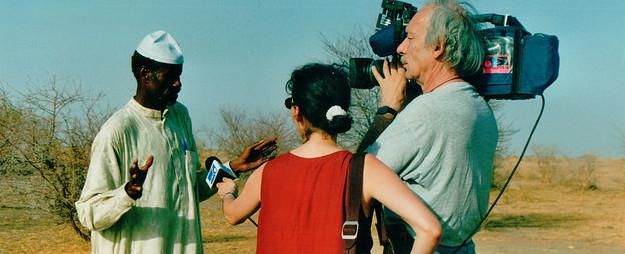In Paul Malong’s Kingdom: Politics on South Sudan’s Periphery – by James Copnall

To his numerous supporters, Paul Malong, the chief of staff of the SPLA, is known as King Paul. He is lionized for his strategic military brain, and his ferocious determination to conquer back all the territory in the hands of Riek Machar’s rebels.
Malong’s detractors – and there are many – are mainly silent, at least in public. The man has a reputation for ruthlessness.
Until he took command of the SPLA, in April last year, Malong was the governor of Northern Bahr el Ghazal. He has maintained a strong grip on the state, an absentee landlord who nevertheless knows everything that happens on his property, and influences most of it.
Initially Malong was replaced by a caretaker governor, Kuel Aguer, who came up from Juba, apparently with Malong’s blessing. Within a few months, Kuel had been impeached, and then dismissed.
The trouble apparently started on day one. Kuel made a speech promising to tackle corruption, which may have antagonised Malong, who reputedly has sizable assets in the state. Kuel also made what many saw as a dismissive reference to Malong’s numerous wives.
Kuel got some roads built, to general approval, and named a new ministerial team, replacing some of Malong’s appointees. This almost certainly annoyed Malong. He had already publicly warned Kuel, in vivid, easy to understand imagery, that nobody should uproot the trees he had planted.
Kuel’s removal still stirs up strong emotions in the state, almost three months after it was announced. ‘Most of us support Kuel’, confides one political figure, though Malong certainly has his loyalists among the political class too.
Malong remains the chairman of the SPLM in Northern Bahr el Ghazal. This has its uses. A perceived enemy can be thrown out of the SPLM – and thus lose his or her ministerial or official job too. In one of the poorest parts of South Sudan, few would willingly give up the ministerial car or salary, and the other opportunities a post like this brings.
Malong is a strong man, a war hero, and in some ways is typical of many of the political class now running the country. Although he has a reputation as a brilliant general, he is not someone with the sort of advanced educational background that many South Sudanese would require from their leaders.
Malong’s opponents fear him. I found it difficult to get anyone to talk on the record about the ex-governor, though plenty were willing to whisper unattributed criticisms.
There are certainly many allegations about the 2010 elections, which were as controversial here as they were in many parts of South Sudan. Malong won the SPLM nomination, and then was announced as the winner of the poll itself, despite claims made by his closest rival, Dau Aterjong, that the vote was rigged.
Dau initially kicked up a fuss, but was persuaded to set his personal ambitions aside. However after the civil war began in December 2013, Dau agreed to join Machar’s rebels.
Dau is perhaps the most senior Dinka in Machar’s ranks, and he comes from a historically important family in Aweil North. Nevertheless, his rebellion has made little progress.
Northern Bahr el Ghazal state officials insist he is based over the border in Sudan, and receives support from Khartoum. Dau’s troops have launched the odd raid in Northern Bahr el Ghazal, largely overnight attacks in Aweil West, but seem incapable of holding territory or seriously worrying the government.
Any political opposition to Malong in his home state, limited as it is, comes within the framework of the SPLM. Party grandees who are critical of Malong gather in ‘internal exile’ in Juba to attempt to sway President Kiir against Malong.
Other parties – the formal opposition – struggle even to conduct their affairs inside Northern Bahr el Ghazal. This is very nearly a one party state. As such it is an amplified version of the national picture.
Malong is a fighter (a judgment he agreed with when I spoke to him a few years ago), but he is not a cartoon villain. Those who know him say he can be won over by argument, even if initially he disapproves of an idea.
Among all the governors of border states, he has managed to maintain (or create) the best relationship with the Sudanese. As governor, Malong instigated yearly conferences with the Misseriya and Rizeigat to regulate their annual descent with their cows into Northern Bahr el Ghazal in search of better pastures. This was a deeply pragmatic decision, but not an easy one, given the bloody history of Murahaleen raids in Northern Bahr el Ghazal.
All this matters because of Malong’s national stature. The bellicose SPLA chief of staff is seen by many as a driving force in Juba.
There are some, in fact, who believe that Malong wields the real power in South Sudan; President Salva Kiir, several politicos told me, cannot openly challenge Malong. While this is conjecture, it is impossible to deny Malong’s heightened significance in South Sudanese politics right now.
This doesn’t mean he will be army chief of staff forever. One rumour in Juba suggests he will be replaced in the upcoming reshuffle, perhaps in favour of one of the military men among the former detainees.
In this hypothesis, Malong’s stature has grown to such an extent that he represents a threat. True or not, it highlights why Malong has every reason to keep a tight grip on Northern Bahr el Ghazal, a base he could return to if necessary.
The ex-governor has constructed a large house just off the road to the airport in Aweil, the state capital. He sometimes returns here at weekends, though the current acting caretaker governor, Salva Chol Ayat, insists it is not to give him orders, merely for some rest. In reality, of course, the acting caretaker governor does not have permanent status, struggles to take decisions, and probably won’t be in the job after the reshuffle.
It’s not clear how long ‘King Paul’ will remain in charge of the SPLA, but there seems little prospect of his influence in Northern Bahr el Ghazal diminishing any time soon.
James Copnall is a journalist and author of ‘A Poisonous Thorn in our Hearts: Sudan and South Sudan’s Bitter and Incomplete Divorce’. He is editor of “˜Making Sense of the Sudans’.







Great notes of observation Copnall. Let us wait to see how it will play out, the South Sudanese politics. Thanks.
Respond to James Copnall, the fear inside Whiteman: The inferiority of a Whiteman internally and the fallacy of claimed superiority of outside world
“In Paul Malong’s Kingdom: Politics on South Sudan’s Periphery, To his numerous supporters, Paul Malong, the chief of staff of the SPLA, is known as King Paul. He is lionized for his strategic military brain, and his ferocious determination to conquer back all the territory in the hands of Riek Machar’s rebels. James Copnall of BBC
By Gatluke Chuol Reat
My logic classes in philosophy taught me this; the foolproof way to understand other is to ask yourself, what the author of the argument is trying to get you to believe. The answer to this question is the conclusion. To this point, men who studied philosophy, especially logic component of the philosophy, can draw many things from any article or opinion about other people by outsider like James Copnall and Eric Reeves; the tittle of their articles, the language that is being used in the body of the article, the depictions or imaginary and of course conclusion of their articles. I know that we were told that the premises can be false but that doesn’t mean that the conclusion must be false too.
As per this opinion, I don’t whether James Copnall of the BBC or his likes, such as Eric Reeves have ever across the works of Evans-Pritchard of 1930s about the Nuer. In case did not across this man’s works about the Nuer, reviews on Evans-Pritchard’s primary goal, while study the Nuer was to document Nuer’s political institutions so that they could be more effectively brought under British rule. Of course this is aftermath of the failure of the British Empire to conquer the Nuer Land. This focus is evident in the format of The Nuer. Nuer political institutions can only be understood in a larger framework encompassing both ecological and kinship systems. This description came from observers who study Evan-Pritchard
The events of massacred of the Nuer in 2013, the AU’s inquired South Sudan said clearly that “The Commission received three different responses to the question: Who carried out the killing of Nuer civilians in Juba from December 16 to 18? The most widespread explanation was that the body of killers was a body of irregulars recruited in two districts of Bahr el Gazal by the current Chief of Staff who was then Governer of Northern Bahr al Gazal and ran the party branch in the district. He started recruiting this force in 2012. According to Majak Dagot, then Deputy Minister of Defense, “we did not pay for it from the Ministry of Defense, though they tried to get us to pay from our budget. The force was 15,000 strong, and was recruited in one area. Among people who gave roughly the same account, numbers varied, from a low of 3,000 to a high of 15,000.â€
Needy to say the least, after I across James Copnall’s writing about the “bitter and incomplete divorce†between Sudan and South Sudan. Then, I start paying attention to his reports on line and other news outlets. Without any surprise from a man like me, I came to across to his writing about what he thought to be “King Paul Malong†a brilliant general. Here he said, “Malong is a strong man, a war hero, and in some ways is typical of many of the political class now running the country. Although he has a reputation as a brilliant general, he is not someone with the sort of advanced educational background that many South Sudanese would require from their leaders.â€Then my eye was caught by something and that is the conclusion of the his article where he said, “It’s not clear how long ‘King Paul’ will remain in charge of the SPLA, but there seems little prospect of his influence in Northern Bahr el Ghazal diminishing any time soonâ€
I cannot remember the last time I ever watch the BBC or the time I recognized the inferiority of the inner circle of the Whiteman and this can be easily proven by a low live men like James Copnall and Eric Reeves. Their ignorance always come with too many forms, however, the common forms or easier passes they often used are ignorance and by trying hard that the African people does not understand the dirty of Whiteman’s imaginaries and depictions of Africa with the cloud of blood filled with sadness. But I want to tell James Copnall and his likes that Africa is beyond depictions and no longer accept false praises on murderous individuals within Africa continent.
Stop this depiction, it is often that men like James Copnall a BBC reporter and his likes will keep lowering themselves to the lower point of Whiteman’s inferiority inside him and claims nonsense from the outside. These men often choose and pick only what suite their inferiority to think that this is the only way to keep Africa down. Their daily lives become that of write and depicted of horrors news and sadness about Africa and left the real news unreported. One would think that a professional journalist would only write or reports a “reviewed†article that bears it truth nothing but truths. Paul Malong is not a King but a masterminded who master how South Sudan will drawn in thinking that Dinkas will eventually be superior just to massacred Nuer civilians in Juba. Paul Malong is nothing but a killer who trained 3,000 to 15,000 tribal men with one goal and that is killed the Nuer
The reality about Paul is his barbaric behavior
And his brutality against his own .therefore he will have little lifespan in ss politic .
James Copnall on African Arguments: Does hate matter in media?
It is twenty months since war broke out. Hundreds of thousands have been displaced from their homes, livelihood destroyed and many more millions at risk of food insecurity. Peace efforts are being made by the IGAD-plus mediation, and there are faint glimmers of hope of peace returning soon. As stakeholders – government, rebellion, political parties, civil society and former political detainees – return to Addis Ababa for the next round of peace talks, we expect them to bring peace back home.
The ongoing conflict is purely a domestic affair all South Sudanese should shoulder, a result of fractured political class with many stakes for power. We long for restoration of a lasting peace, to help generations overcome the miseries of our times and leap higher. By accepting to live as one people we shall attain greater heights.
It is possible to be apprehensive of mischievous hands behind the tragedy that has befallen our country. Special reference is to be made to the international media who have an apparent commonalty in their tone; perhaps attributable to the fact they all exist on funding from donours.
This suspicion is further reinforced by the fact that the ongoing conflict provides a situation even more favourable for such projects that seek to promote freedoms, rights and good governance, the business niche for paid journalists. Criticism of government and advancing the cause of civil society and, in worst cases, provision of humanitarian aid form the core of operations of international nongovernmental organizations. The media is vital in reporting progress in these parameters of the society., so as long as these fundamental roles are played in good faith there is always positive impact on the lives of ordinary citizens.
But there exists some reservations on the intentions of some media , as seen, for instance, in ‘In Paul Malong’s Kingdom: Politics on South Sudan’s Periphery’, a recent commentary by BBC’s James Copnall that featured on the African Argumentsblog, a web blog seemingly run by Copnal himself. The author personalizes the whole status quo on a single political and military figure. The basis of the choice of his victim, the SPLA Chief of Staff Gen. Paul Malong Awan, provides a thought-provoking matter to understand.
Neither of Copnall’s account of the events in Northern Bahr El Ghazal nor that on Paul Malong is intelligible. If there is any gain from reading the article it is the romantic literature used to present it and, conversely, some satisfaction with the assassination of a politico-military character by an unsuspecting writer, the sort of perceived satisfaction resulting from where one thinks they have succeeded because their opponent has failed.
It is unthinkable of anyone to attribute Copnall’s thought to lack of ethics, given his vast experience in reporting from many countries across African. As a senior reporter for the BBC, there is no doubt in his capacity to strike balance in controversial stories: while voicing the concern of politicians whom he describes as ‘party grandees who are critical of Malong in ‘internal exile’ in Juba to attempt to sway President Kiir against Malong’ he could have just had the same chance to get a piece or two from the target, for that is what impartial journalists are known for. Anyay, it is absolutely a matter of choice to him to report for evil or good sake.
There is no idea as to how the issue matters if one has idea of Copnall’s recent travels to South Sudan for the swearing in of Pagan Amum as SPLM Secretary General and, seemingly based on derived articles, report on the chaos that rocked Yambio (Western Equatoria State).
Back to the substance of the argument, the upheaval seen in Northern Bahr El Ghazal constituted a political matter that was resolved within the political framework of the state assembly and the involvement of the national government in Juba.
Notwithstanding its prejudiced status, Copnall’s report, however, centers on the possibility of a single political who appears to have had significant leverage.
The country has been turned into a theater of international politics and war. It is up to South Sudanese to choose to live by what they think is right or choose to perish by consuming reports packed with hate. We have seen that dividing a political unit breeds war, with sequential flaming of war. It is unacceptable for James Copnall and his likes to further divide our politicians into angels and demons, because these two entities can never co-exist. Instead we need our people to be united for a just cause. There are many untold stories of production and progress he can write about.
The author of this article is a former Sudan tribune daily newspaper editorial secretary, and currently a daily columnist of an electronic website newspaper based in Accra,Ghana.
While he is reachable through [email protected]